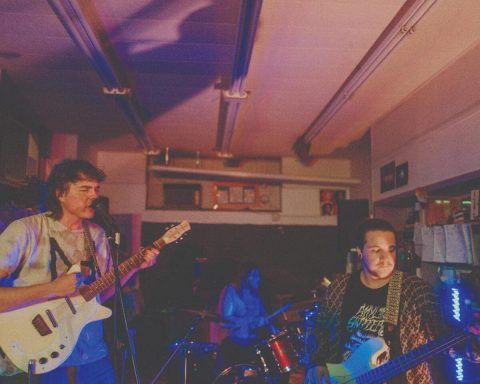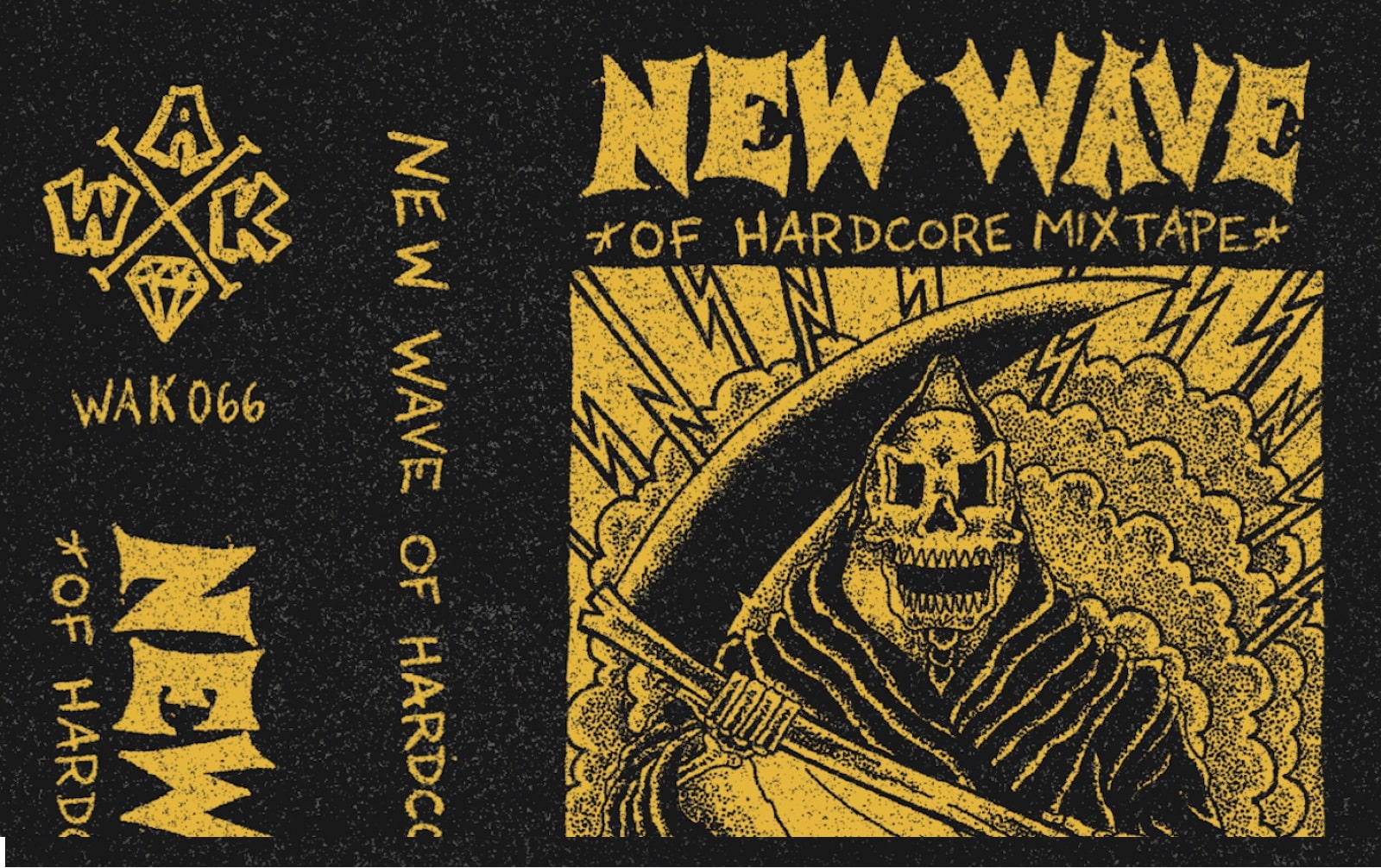Exploding like a bomb in your face, “For the Love of It”, the newest full length album from Canadian mathcore / chaotic hardcore band FEMUR stabs with fury and relentless aggression throughout its 43:43 running time. Marked by a continued exploration and better production, “For The Love Of It” is a distillation of everything that makes the extreme, chaotic hardcore such a great niche. Today, we’re giving a nod to its bleak burst of heavy riffs, entertaining mood changes and frantic energy, with a special track by track commentary, offered by the band themselves!
Femur are one the best things going in Canadian heavy music. Their debut record, Red Marks, saw the group pop onto the radar of many with their dizzying mathcore-meets-sludge. For the Love of It sees the band further pushing these elements in a more refined manner, making it one of the best heavy albums fans will hear in 2020. Femur’s music is always unsettling in the best way possible. The odd-timed riffs of “Unconditional” and the Black Sheep Wall plod of “Often & Softly” highlight the ways that Femur are always able to bring the heavy through unconventional means. If you are looking for heavy riffs, Femur always deliver. / Exclaim.ca
Track 1: “The Shakes”:
Sonically, I think this song starts the album off perfectly amidst this new batch of tunes. It’s simple, yet furious, and leaves you with a suspenseful cliffhanger that leaves you looking for more. Lyrically, I wanted the opening track to pick up where Red Marks left off. The lyrics on Red Marks are almost exclusively negative and self-deprecating; reflective of the times. So, the opening track on For the Love of It starts with the lyric “in the wake of that which is cold, we feel the cracks with fragments of gold”. Cold being all the negative subject matter on the Red Marks, and filling the cracks with fragments of gold being a conscious effort to make positive change in one’s life, while still acknowledging and accepting the past.
Another key lyric in this tune is the final lyric “I’ve got the shakes again, I can’t stop thinking of potentially what could’ve been” which I think is such a universally applicable theme, and is meant to be open to interpretation.
Track 2: “Just because you can doesn’t mean you should.”:
This song made sense to put second because the first note on the bass our bassist [Eric Niemi] plays in this song resolves the tension of The Shakes because they both share the same root note. We also wanted a song we hadn’t released yet to bridge the gap between The Shakes and the next song, Brian Wells, which had also been released as a single prior to the release of For the Love of It. We felt it perfectly carries the momentum in this portion of the album.
This song explores lyrical themes that I haven’t really delved into before, which is outward anger, hah. My lyrics in the past have mostly been self-critical, but after coming up with that opening lyric “Just because you can doesn’t mean you should”, it felt natural to expand on that idea. This song isn’t in direct reference to anyone or anything necessarily, but it is definitely in direct reference to which impulses people choose to act on, and how those actions subsequently define their character.
Track 3: “Brian Wells”:
This song, musically, is a lot of fun for us, plain and simple! It follows a very typical rock song structure, but is littered with odd-meter time signatures and other non-typical rock song practices.
It’s also in dedication to Brian Wells, whom the song is named after. It’s not that I’m necessarily passionate about his story or anything, but I definitely find it interesting. Without getting into too great of detail, it just feels like his general willingness to comply was taken advantage of by someone he trusted, ultimately resulting in his death. It’s a hyperbole of a theme seen all the time in common life, and felt like a strong subject people could relate to. It’s a small contribution, but this song is directly meant to honour his name, I hope there’s no mistake about it.
Track 4: “Unconditional”:
This was the last song we wrote for the album, and it almost didn’t make the cut! We were rehearsing in preparation for a show back in December of 2019, and then in between practicing our regular repertoire we spontaneously broke out into a jam of the, now, verse section of the song. I’m pretty sure we wrote the chorus and the beginning of the B-section of the song that same evening, and then pieced it together in a way we could perform a rough, instrumental version of the tune for that upcoming show.
For anyone keeping track, it’s also the first time we’ve used guitar tapping in a song too.
When we finished writing the song, we were trying to decide if it worked for the album. There were talks of releasing it as a B-side track at a later date, but ultimately we decided that the song helped showcase an evolution in our sound as a band, and that was something we thought was important to include on the album.
Around the time we were writing this song, I heard the term “unconditional love” used somewhere, and it stuck with me. You’ll notice that love appears a lot on this album…
It made me spend some time thinking about how valuable it is having a strong support system in one’s life.
Continued below…

Track 5: “Fish Church”:
This was a song that came together in a matter of a couple attempts, in fact. The writing started with the busy drum beat that our drummer [Dylan Maxwell] plays for most of the song, and I recall the first riff that was played to accompany that drum beat was the riff you hear in the verses and choruses. Dynamics play a big role in how this song navigates itself, and this song, like Unconditional, were active attempts to write songs with less parts. Allowing certain ideas the time to develop more gradually. The name doesn’t hold any major significance. One day Niemi brought in a list of potential song names he thought were interesting, and this one stood out in particular.
This song, like Unconditional, has lots of play room for the vocals. As it usually goes for me, I whittled quite a bit at the original draft of the vocal part, but I didn’t want to take too much away because of how much space there is for the vocal line to breathe. Finding the balance between the busy drum beats, and the sluggish and repetitive guitar parts took some time, but in the end we settled on something that we thought worked well for the track.
Lyrically, this song touches on recurring themes that can be found across most of the album, which are those of seeking positive change in one’s life.
Track 6: “Often & Softly”:
The opening lyrics of this song might have been the first bit of material written for this album. I believe they were written sometime in early 2017, around the time we were starting to record Red Marks. It’s also important to note that they were written with the intent of them being sung over a 6/8 time signature, so the open riffs of the song were written to accommodate the vocal part, which isn’t all that common for us.
Lyrically, the first half of this song is more reminiscent of our first album, but as it moves along it starts introducing more hopeful themes.
Track 7: “Gulazzi”:
There’s this cat that lives across the street from Dylan and I that would come around all the time, particularly last summer, and would just hang out with us on our front steps or even walk into the house if we let the door open. We ended up nicknaming him Gulazzi after a long-running joke amongst all of us in the band, and when it came time to naming this song we jokingly decided on Gulazzi thinking it may have changed, but it stuck and here we are! I feel like these lyrics could easily be open to interpretation, but specifically they’re about a fictitious battle we’re waging with this cat; nothing more, nothing less.
Track 8: “Welcome Wind II”:
In the early stages of conceptualizing this album we discussed wanting to write a sequel to the original Welcome Wind from Red Marks, so the idea for another ambitious, post-something epic was there before we even had any of the parts written for the song. It wasn’t until a fated, mushroom induced, evening of Christmas 2017 where two main riffs were written, and from there we were able to start piecing the song together through a series of rehearsals.
Lyrically, this song is about the death of a loved one and the process of dealing with the loss after the fact. There are a couple lines at the end of the song which draw direct inspiration from ‘In Remembrance’ by Elanor Daley which read “I don’t want you to stand at my grave and cry. I am not there, I did not die”. We’ve all experienced death and its hardships, hopefully this song can offer some comfort to that.
Track 9: “Mr. G”:
Mr. G may collectively be one of our favourite songs on the album; it offers up a wide range of dynamics, both instrumentally and vocally, as well as an alternate tuning to the rest of our catalog, which we’ve never attempted before. It was the combination of this new tuning and Dylan’s suggestion that we try writing a song that focused less on shifting between multiple parts, and instead letting one idea develop gradually over a longer period of time. We took this approach on songs like Fish Church and Unconditional, but this was the first of those songs to be written, and probably acted as reassurance that it was something we could pull off effectively.
I think it was decided that this would be the last track on the album before I got around to writing the lyrics for it, so I felt it necessary to reel in all the recurring themes of reconciling one’s past, efforts towards positive change, and just general self-acceptance into one, all-encompassing song.












